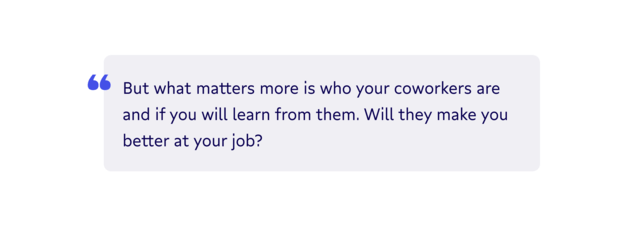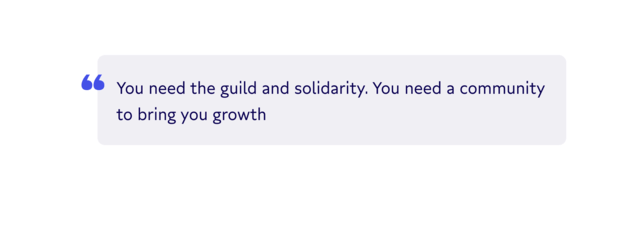Data can be a lonely field. In startups, especially, you’ll often find a data team of one.
While virtually everyone in the company needs data and interacts with the data team, professionals on the business-side of things often have little to no understanding of what the data folks are actually doing, never mind what challenges they face.
“If you are truly a data team of one, you may or may not be appreciated and measured correctly, because your stakeholders and management chain have no ability to calibrate,” Census founder and CEO Boris Jabes said. “It can be frustrating.”
The benefits of the data community
Boris attributes the momentum driving the data industry today to the people working together to build better data systems, rather than the wealth of new technology available.
Every industry advancement began with a catalyst: a person or small group of people who imagined something new was possible. Those visions then became reality when more people came on board to advance and adopt them.
Community has played a giant role in connecting such people.
For junior data professionals with just a few years of experience especially, there’s a deep need to connect with people more senior in the field. You can solve algorithms, create data sets, process pipelines, and expand general analytical skills independently. However, the ability to dissect ideas, the exposure to fresh viewpoints, and the chance to learn from the mistakes of others are crucial to developing essential hard and soft skills — and these can only be gained by interacting with other big data folks.
“A startup will give you a lot of work to do with a lot of scope,” Boris said. “But what matters more is who your coworkers are and if you will learn from them. Will they make you better at your job?”

So what happens if your data team is small, or everyone has little work experience? Then it’s up to you to find community outside the company. That’s how Jessica Cherny, a full-time senior data analyst at Ironclad, came to start Data Angels in 2020. Cherny and her sister Diana, also a data analyst, wanted to give women in data an informal forum where they could meet and engage others with similar job titles.
“We wanted to build a place for all analytics folks; where senior data folks can mentor, and junior folks can learn about data while dipping their toes into it in a safe environment,” Jessica explained. “A big thing that drew me to data science in college was that it is so collaborative. It felt very welcoming, so I wanted to build a place that captured this feeling.”
A community gives data professionals a place to commiserate with others who truly understand the challenges of their career path. It can be both a collaborative space to work through sticky issues, and an educational hub to advance technical skills.
It’s why we launched the Operational Analytics Club earlier this year. The OA Club gives members a space to learn from each other; it’s a space for data folks to go beyond the responsibilities of their job description, to connect with people who share their passion, and to network with people who can advance their careers.
Building your data career through relationships
In every industry, relationships are crucial to career advancement – and data is no different. Jessica was connected to the team at Ironclad through her relationship with her college mentor, whose venture capital firm had recently invested in the startup. Ironclad had no data team when Jessica came on board, so she spent two years as a data analysis team of one.
“My mentor saw that I wanted to do data analytics at a tech company, and he knew that the team at Ironclad was collectively really smart and had a low ego,” Jessica said. “I interviewed, and it was easily the best interview experience I’d ever had.”
Jessica’s boss, the vice president of product, had a data background and understood how important it was for her new junior analyst to learn the industry’s best practices from people who had experience in the field. Since there were no senior data people on the team to take her under their wing, Jessica was matched with other people from her supervisor’s network for one-on-one meetings and coffees.
The experience proved so valuable, Jessica took it upon herself to expand her network before opening it up to more women in data.
“I thought, hey, I could do this myself,” Jessica recalled. “I could reach out on LinkedIn or Slack and talk to people who are senior data analysts or directors of data – the kind of people I want to be when I grow up.”
Jessica’s initial list of 25 contacts eventually formed the foundation for Data Angels. She and her sister invited people they already knew to join the community and began posting about it to their social media channels. When Jessica began hosting quarterly panels with women in data management roles, interest in the group exploded. Today, Data Angels has around 500 members.
Boris attributes the group’s rapid growth to a hunger among data professionals for beneficial relationships that will help them develop.
“You need the guild and solidarity. You need a community to bring you growth,” he said.

Finding a sense of belonging
Whether you’re a data scientist, software engineer, machine learning engineer, data architect, or data engineer, solidifying relationships with others is key to your success. If you’re a junior data professional with no senior data people in your organization to learn from, you’ll have to seek out those people elsewhere – through formal communities like Data Angels, the Operational Analytics Club, or just by reaching out through Slack channels and online forums.
The data industry is evolving rapidly. While it takes an active approach to stay on top of new tools and trends, data practitioners need to look beyond skill sets to something far greater. They need business strategy, so they can advance their careers, make appropriate business decisions, and be recognized as the organizational leaders they are.
“When you’re a team of one, it can be particularly difficult to map the progression your career should take,” Jessica said. A community of like-minded folks gives data practitioners a frame of reference regarding what their career path progression can look like and help each other achieve what they need to grow in their profession.
“Everyone understands managerial growth, and after decades we understand what it takes to progress in an engineering career,” Boris said. “We’re still figuring out what that looks like for data.”
Listen to the wide-ranging conversation Boris and Jessica had about growing a meaningful data career and managing as a data team of one below or on your favorite streaming platforms. 🎧
Then, head on over to The Operational Analytics Club to discuss your takeaways with your community.


















